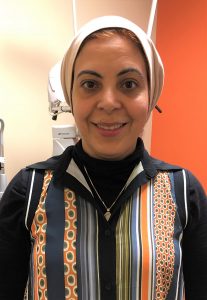

Dr. Al-Namaeh says, “When COVID hit, I saw the opportunity for a virtual eye research center, giving people the opportunity to learn more about doing research.” She notes the presence of ODs who want to do clinical research but don’t know how or where to begin. “I will have basic, 10-hour courses where they learn how to do more clinical research.” The participation so far has left Dr. Al-Namaeh feeling lucky.
KEEP IT CURIOUS
Currently, only volunteer researchers are participating. Dr. Al-Namaeh considers a future possibility of a stipend. “Eventually we can offer an Institutional Review Board (IRB), which can review and approve applications for research, then the researcher can publish,” she says. It can be challenging for ODs outside of academic studies to get involved with research or have publishing opportunities. “We have a limited number of schools, and it’s very competitive. I want to open another door.”
Even ODs who understand the elements of research may not have the time or funds to continue their education toward a PhD or masters degree. “If they’re interested, there’s another way.” Dr. Al-Namaeh knows her colleagues’ strengths lie in their desire to serve their patients. “I think ODs are naturally curious,” she says. “That’s part of what led them to this profession. We want to learn more about new eye diseases and treatments.”
Dr. Al-Namaeh knows the value of existing programs for research, and has no intentions or plans of replacing them or existing fellowship programs. “I would encourage doctors to get their fellowship; but those rely on case studies versus research,” she says. “With research, you have a question and you dig in more to answer it.” The value of in-office research can be that doctors will learn more about their patient base or disease prevalence in their communities, for example. This kind of research can also spark an interest that some doctors can pursue then as part of their fellowship journey.
UP NEXT
At the moment, Dr. Al-Namaeh is the single driving force behind the Eye Research Center. “Eventually, I will have an IRB partner,” she says. She points out that with the growth of telemedicine the trend of virtual learning in optometry only makes sense – and she believes that the foundational and deeper-dive support she can provide to researchers will be beneficial. “I think I can give a lot and I can help a lot.”
Already, the center has launched some additional education opportunities, including a full day of COPE-approved CE live webinar on Aug. 7, 2021. Sessions include diagnostic technologies and treatments or management of ocular disease, glaucoma, anterior segment laser procedures, AMD, ocular manifestations of Parkinson’s Disease and more. Learn more and register here.



